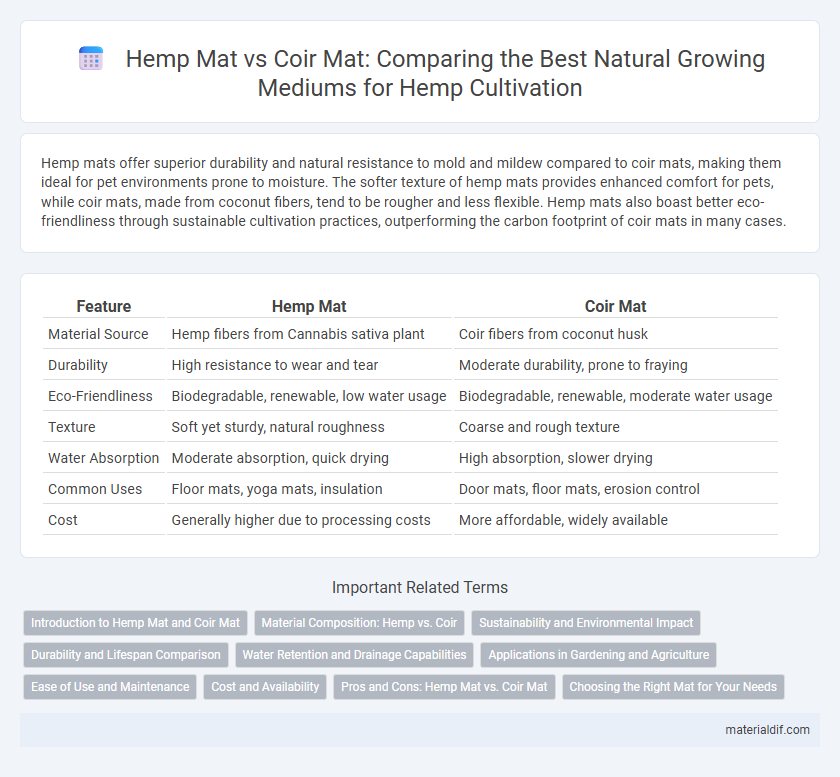Hemp mats offer superior durability and natural resistance to mold and mildew compared to coir mats, making them ideal for pet environments prone to moisture. The softer texture of hemp mats provides enhanced comfort for pets, while coir mats, made from coconut fibers, tend to be rougher and less flexible. Hemp mats also boast better eco-friendliness through sustainable cultivation practices, outperforming the carbon footprint of coir mats in many cases.
Table of Comparison
| Feature | Hemp Mat | Coir Mat |
|---|---|---|
| Material Source | Hemp fibers from Cannabis sativa plant | Coir fibers from coconut husk |
| Durability | High resistance to wear and tear | Moderate durability, prone to fraying |
| Eco-Friendliness | Biodegradable, renewable, low water usage | Biodegradable, renewable, moderate water usage |
| Texture | Soft yet sturdy, natural roughness | Coarse and rough texture |
| Water Absorption | Moderate absorption, quick drying | High absorption, slower drying |
| Common Uses | Floor mats, yoga mats, insulation | Door mats, floor mats, erosion control |
| Cost | Generally higher due to processing costs | More affordable, widely available |
Introduction to Hemp Mat and Coir Mat
Hemp mats, made from natural fibers of the hemp plant, offer durability, biodegradability, and resistance to mold and mildew, making them ideal for eco-friendly flooring and insulation. Coir mats, derived from coconut husk fibers, are known for their coarse texture and excellent water resistance, commonly used in doormats and erosion control. Both hemp and coir mats provide sustainable alternatives to synthetic materials, with hemp mats excelling in strength and longevity while coir mats deliver superior moisture handling.
Material Composition: Hemp vs. Coir
Hemp mats are made from natural hemp fibers, known for their durability, moisture resistance, and eco-friendly properties due to hemp's fast growth and minimal pesticide use. Coir mats are produced from coconut husk fibers, offering high water absorbency and rough texture, making them effective for scraping dirt but less resistant to prolonged moisture exposure. The choice between hemp and coir mats hinges on the balance between hemp's sustainable strength and coir's natural abrasiveness tied to their distinct fiber compositions.
Sustainability and Environmental Impact
Hemp mats offer superior sustainability compared to coir mats due to hemp's rapid growth cycle and minimal pesticide requirements, significantly reducing environmental impact. Hemp fibers require less water and regenerate soil health, while coir mats, sourced from coconut husks, depend on limited coconut production and often involve energy-intensive processing. Choosing hemp mats supports carbon sequestration and promotes biodegradable, eco-friendly products with a lower overall ecological footprint.
Durability and Lifespan Comparison
Hemp mats exhibit superior durability compared to coir mats due to their dense fiber structure and resistance to moisture and mold, resulting in a longer lifespan often exceeding five years under regular use. Coir mats, derived from coconut husks, tend to wear down faster, particularly in high-traffic areas, with an average lifespan of two to three years. The natural toughness and resilience of hemp fibers make hemp mats a more sustainable and cost-effective choice for long-term floor protection.
Water Retention and Drainage Capabilities
Hemp mats exhibit superior water retention properties due to their dense fiber structure, making them highly effective in maintaining soil moisture for extended periods. In contrast, coir mats offer excellent drainage capabilities, allowing excess water to pass through quickly and preventing waterlogging around plant roots. The choice between hemp and coir mats depends on specific gardening needs, with hemp favored for moisture retention and coir preferred for optimal drainage.
Applications in Gardening and Agriculture
Hemp mats offer superior water retention and biodegradability compared to coir mats, making them ideal for seedling protection and soil erosion control in gardening and agriculture. Coir mats, derived from coconut husks, excel in durability and resistance to fungal growth, which benefits long-term landscaping projects and pathways. Both mats promote sustainable practices, but hemp's faster decomposition rate enhances soil nutrient cycling in crop production environments.
Ease of Use and Maintenance
Hemp mats offer superior ease of use due to their lightweight and flexible nature, making installation and handling straightforward. They require minimal maintenance as hemp fibers resist mold, mildew, and pests naturally, reducing the need for frequent cleaning. In contrast, coir mats are heavier and more rigid, demanding more effort to clean and maintain, especially in damp environments where they can degrade faster.
Cost and Availability
Hemp mats generally cost more than coir mats due to the more labor-intensive processing required for hemp fibers, but they offer greater durability and environmental benefits. Coir mats are widely available and budget-friendly, made from abundant coconut husks, making them a popular choice for affordable, natural floor coverings. Availability of hemp mats is increasing in eco-conscious markets, though coir mats dominate in terms of global production and distribution channels.
Pros and Cons: Hemp Mat vs. Coir Mat
Hemp mats offer superior durability and natural resistance to mold and mildew compared to coir mats, making them ideal for high-traffic areas and moisture-prone environments. Coir mats excel in abrasion resistance and provide excellent scraping action to remove dirt and debris but tend to deteriorate faster when exposed to excessive moisture. Both mats are eco-friendly, with hemp mats using faster-growing fibers and coir mats derived from coconut husks, influencing their sustainability and lifespan.
Choosing the Right Mat for Your Needs
Hemp mats offer superior durability and natural antimicrobial properties, making them ideal for heavy foot traffic and moisture-prone areas, while coir mats provide excellent scraping ability and water resistance due to their stiff coconut fibers. When choosing the right mat, consider hemp for eco-friendly longevity and indoor use, whereas coir excels as an outdoor doormat for debris removal. Evaluating factors such as placement, environmental conditions, and maintenance will ensure the optimal mat selection for your specific needs.
Hemp mat vs Coir mat Infographic

 materialdif.com
materialdif.com